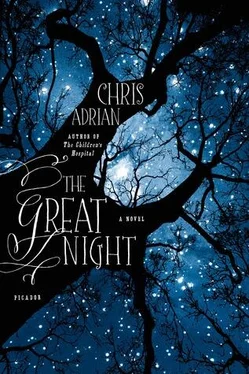“What sort of toast is that?” asked Fell. “You mortals are all so rude !” In answer, Henry put his hands over his face and crouched down on the floor, looking like someone was about to hit him.
“It’s okay, dude,” Molly said. She was pale, and her face had begun to sweat. “None of this is real.”
“Yes, it is,” Henry said from underneath his hands. “Yes, it is!”
“Don’t you all understand?” Will said, practically shouting it. “Everything is going to be fine!” But as soon as he said it they all heard a giant noise: a gong and a clang and a thud. Will didn’t ask what it was: the noise put into his head a perfect little movie of the iron doors toppling from their hinges.
“Uh oh!” said Oak.
“Oh, my!” said Fell.
And Lyon shouted, “Run!”
Will and Carolina went to movie night at Dolores Park. It was Will’s idea. Carolina said she preferred books to movies, and she didn’t even have a television, but she liked the idea of being outside, and Dolores was one of her favorite parks. Will didn’t usually like people who didn’t like movies, though he agreed that there were lots of stupid movies (though not necessarily fewer stupid movies than stupid books), and he tended especially not to like people who made a fuss about liking books better than movies. But it was ostensibly true as well that he didn’t like girls with short hair, or broody women, and people who didn’t have to work for a living, and Carolina was all of those. These were all separate issues that had no impact at all on how much he loved her, which was a surprise; he never would have guessed how little he ever could have anticipated of the shape and the character of the person he had fallen in love with. But then again the whole experience of her had been a giant surprise.
The surprise was more lovely than not, but sometimes it was terrible, or at least terrifying — every now and then he was seized with a panicked what am I doing? feeling, but whenever that happened, when he was disturbed by thoughts of Carolina while he was at work in someone else’s garden, or waiting in line for a sandwich, or laboriously pedaling his bike up a steep hill, it was thoughts of Carolina that soothed him again. It was all very weird and very wonderful and felt ill-deserved somehow, which he told her repeatedly. “I don’t deserve you,” he’d say, long before he had started doing things to make that a true statement, and she would reply, “Sure you do. Everybody deserves to be in love.”
“What makes you so sure of that?” he asked her during a picnic conversation under the tree, and she looked at him like he was from the moon.
“Everybody deserves to be happy,” she said, like she was walking him through a math problem. “Everybody needs to be in love to be happy. Therefore, everybody deserves to be in love.”
“Maybe not everybody needs to be in love to be happy. And does everybody really deserve to be happy?”
“Absolutely,” she said. She lay on her back with her feet on the tree, her hips bent almost at ninety degrees. Will sat crosslegged at her head, staring down at her face.
“Everybody? Genghis Khan? Dracula?”
She sat up and took the knife from her plate. “Everybody,” she said. “For a little while, anyway. I’ll write it down, so you won’t forget.” She started carving letters into the silver bark with a knife, but Will stopped her. “That’s bad for the tree,” he said.
The movie was Soylent Green , which Will had never seen before, even though a drunk girl had run naked through his dorm one night in college screaming that Soylent Green was people, so his interest was piqued and he always meant to rent it. But the best thing that could be said about it, he decided, was that it was enormously dispiriting, and they both decided they would have been better off never having seen it. “That was a bad movie,” he said to Carolina later, “but not a badly made movie.” That led them to a discussion about whether a movie could be bad for a person or generate ill in the world. Will said he didn’t like it when art did nothing but make you feel bad, and Carolina replied that she thought that was weird, considering how relentlessly depressing his stories were.
“That’s different,” he said, though it was hard for him to articulate exactly how. “I didn’t write those stories on purpose,” he added. “I mean, I did, but they’re not designed to make people sad. They’re not supposed to increase the total sadness in the world. They’re supposed to do the opposite of that.” Though that wasn’t exactly true either. He thought it would be most accurate to say that they were supposed to make him feel better and worse at the same time, and that he couldn’t really speak for anything they might do to someone else. But he didn’t say that. Carolina kissed him and said again how much she thought Ryan and Sean would have liked each other. Sometimes she talked about how much they had in common, anxiety and dissatisfaction and a troubled relationship with their parents and even being dead, in a way that made it sound like they belonged together even more than she and Will did.
It was a dispiriting movie but not a dispiriting evening. The weather was not traditionally lovely, but it was the kind of evening, cold and just foggy enough to put golden halos around the streetlights, that Will really liked, and the whole enterprise of giggling at an earnest depiction of dystopia, snuggling in public while vendors sold popcorn and hash cookies and mushroom cordials, seemed like something that would only happen there. He felt very lucky to be lounging in this city and in this park and with this woman, which was part, he supposed, of feeling like he didn’t deserve any of it.
“This movie is making me hungry,” she said. Will got her some popcorn, and when the lady came walking along the slanted edge of the hill, stepping carefully between blankets and towels and softly calling out, “Special cookies! Special cookies!” he ordered two. That made him a lot better disposed toward the movie, and it seemed okay, after the cookies and three beers from Carolina’s backpack, that Soylent Green was people, that women were treated like furniture and old people were euthanized, that they put down Edward G. Robinson as gently and ruthlessly as a dog.
There was a feeling in him that misogyny and food riots and cannibalism and Charlton Heston’s despair did not preclude the existence of justice and beauty in the world. Mr. Heston might run off the screen and, seconds after the movie ended, run into a girl with a Monchhichi hairdo who could demonstrate that it didn’t matter at all to your happiness what was happening five minutes ago, or five years ago, or fifteen. In fact, she might be running from the opposite direction, having just discovered, in another factory, the terrible truth about Soylent Green (which he was suddenly drunk and stoned enough to realize was the truth about life , the horrible open secret that everyone thought they had to ignore to be able to plod through one more day), which was to say it was people, it’s hard to be good, and brothers die. She knew this as well as he did, and she was running from the truth as spastically as Mr. Heston, and yet when they ran into each other she would tell him, very sincerely, that despite all that, despite everything , everybody still deserved to be in love.
The movie ended, and people applauded. Will and Carolina had switched positions; now her head was in his lap, and she had fallen asleep. He sat watching her while everyone around them shook out their blankets and gathered up their bottles, while they let the air out of the blow-up movie screen and it wilted away, and the audience — everyone but a few scattered snoring homeless people — was gone from the park by the time he woke her to tell her that he loved her.
Читать дальше












